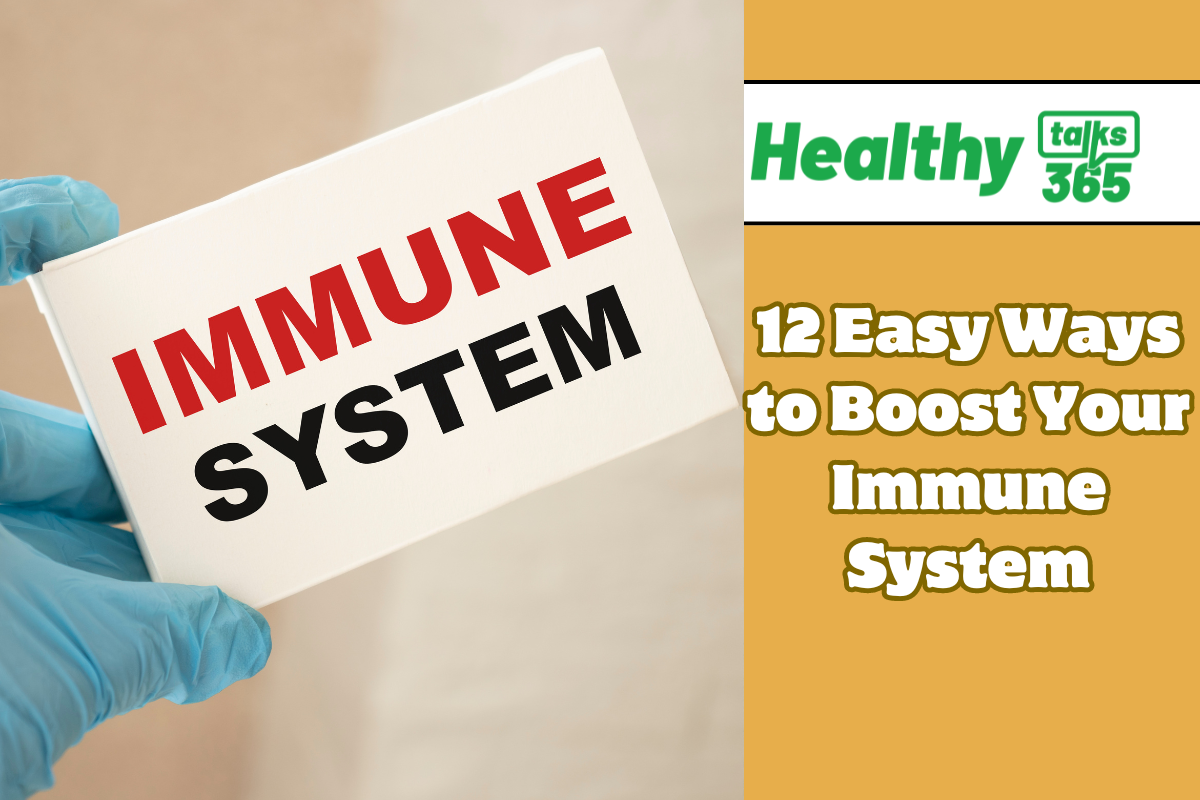12 Easy Ways to Boost Your Immune System
1. Eat a Balanced Diet
A balanced diet rich in fruits, vegetables, whole grains, lean proteins, and healthy fats provides essential nutrients that support a robust immune system. Nutrients like vitamins A, C, D, E, zinc, and selenium play key roles in immune function. Fruits and vegetables are packed with antioxidants and phytonutrients that help combat oxidative stress and inflammation, while fiber supports gut health, which is closely linked to immune function. Including a variety of foods in your diet ensures you get a broad spectrum of nutrients to support overall health and immunity.

2. Get Regular Exercise
Regular physical activity is not only beneficial for cardiovascular health and weight management but also boosts immune function. Exercise improves circulation, which allows immune cells to move more freely throughout the body, and reduces inflammation, which can weaken the immune system. Additionally, exercise promotes better sleep and reduces stress, both of which contribute to a healthy immune response. Aim for at least 150 minutes of moderate-intensity aerobic exercise or 75 minutes of vigorous-intensity exercise per week, along with muscle-strengthening activities on two or more days per week.
Read Also:
Focus While Studying: 10 Proven Methods
3. Stay Hydrated
Proper hydration is essential for maintaining optimal immune function. Water helps transport nutrients to cells, flushes toxins from the body, and supports the function of immune cells like lymphocytes and neutrophils. Dehydration can impair immune responses and make you more susceptible to infections. Aim to drink at least 8-10 glasses of water per day, and adjust your fluid intake based on factors like activity level, climate, and overall health.
4. Get Enough Sleep
Quality sleep is vital for immune health and overall well-being. During sleep, the body repairs and regenerates tissues, produces immune cells, and releases hormones that regulate immune function. Chronic sleep deprivation can weaken immune responses and increase the risk of infections and chronic diseases. Aim for 7-9 hours of quality sleep per night, and establish a regular sleep schedule and bedtime routine to promote restful sleep.
5. Manage Stress
Chronic stress can suppress immune function and increase susceptibility to infections and inflammatory conditions. Stress triggers the release of hormones like cortisol and adrenaline, which can disrupt immune responses and promote inflammation. Practicing stress-reduction techniques such as meditation, deep breathing, yoga, tai chi, or mindfulness can help lower stress levels and support immune health. Incorporate relaxation activities into your daily routine to promote a sense of calm and well-being.

6. Take Vitamin C
Vitamin C is an essential nutrient that plays a crucial role in immune function. It supports the production and function of white blood cells, which are key players in the immune response, and acts as a powerful antioxidant, protecting cells from damage caused by free radicals. While vitamin C supplements can be beneficial for some individuals, it’s best to obtain this nutrient from whole foods like citrus fruits, strawberries, kiwi, bell peppers, broccoli, and spinach. Eating a variety of vitamin C-rich foods as part of a balanced diet is the most effective way to ensure adequate intake.
Read Also:
Healthy Foods For Keeping Healthy Weight In Winters Cold
7. Consume Probiotics
Probiotics are beneficial bacteria that support gut health and immune function. The gut microbiome plays a crucial role in immune regulation, and maintaining a healthy balance of gut bacteria is essential for optimal immune responses. Consuming probiotic-rich foods like yogurt, kefir, sauerkraut, kimchi, and kombucha can help promote a diverse and resilient gut microbiota. Additionally, probiotic supplements may be beneficial for some individuals, especially those with digestive issues or compromised immune systems.
For individuals looking to enhance their gut health further, probiotic supplements are available in various forms, such as capsules, tablets, and powders. When choosing a probiotic supplement, consider factors like the strain of bacteria, colony-forming units (CFUs), and any specific health benefits you are seeking. It’s advisable to consult with a healthcare provider before starting probiotic supplementation, especially if you have underlying health conditions or are taking medications.
8. Avoid Smoking
Smoking is detrimental to immune health and increases the risk of infections, respiratory diseases, and autoimmune disorders. Cigarette smoke contains thousands of toxic chemicals that damage the immune system and impair lung function. Smoking weakens the body’s defenses against infections and slows down the healing process. Quitting smoking or avoiding exposure to secondhand smoke is one of the best things you can do to protect your immune system and overall health.
For those exposed to secondhand smoke, similar risks apply. Secondhand smoke contains many of the same harmful chemicals as direct smoking and can also compromise immune function in nonsmokers, especially children and individuals with preexisting health conditions.
Support resources such as smoking cessation programs, nicotine replacement therapies, and counseling services are available to assist individuals in quitting smoking successfully. Making the decision to quit smoking not only benefits personal health but also reduces the burden on healthcare systems and improves overall public health outcomes.
9. Limit Alcohol Consumption
Excessive alcohol consumption can suppress immune function and increase susceptibility to infections. Alcohol disrupts the balance of gut bacteria, impairs the function of immune cells, and compromises the integrity of the gastrointestinal tract. Chronic alcohol abuse is associated with an increased risk of respiratory infections, liver disease, and certain cancers. Limit alcohol intake to moderate levels, defined as up to one drink per day for women and up to two drinks per day for men, to minimize its negative effects on immune health.

10. Wash Your Hands Regularly
Good hand hygiene is one of the most effective ways to prevent the spread of infectious diseases. Washing your hands regularly with soap and water helps remove germs, bacteria, and viruses from the skin and reduces the risk of infections. Use hand sanitizer with at least 60% alcohol when soap and water are not available, and avoid touching your face, mouth, and eyes with unwashed hands. Practice proper respiratory hygiene by covering your mouth and nose with a tissue or your elbow when coughing or sneezing to prevent the spread of respiratory droplets.
Read Also:
Pregnancy: Signs, Symptoms, Overview, Health Tips You Should Know
11. Get Vaccinated
Vaccinations are essential for protecting against infectious diseases and boosting immunity. Vaccines stimulate the immune system to produce antibodies against specific pathogens, providing immunity against certain diseases. Follow the recommended vaccination schedule for your age, health status, and travel plans to ensure you are up-to-date on essential immunizations. Vaccines not only protect you from infections but also contribute to community immunity, reducing the spread of diseases and protecting vulnerable populations.
Vaccinations are not only crucial for individual protection but also play a significant role in public health. They work by introducing a small, harmless part of a pathogen (like a virus or bacteria) into the body, prompting the immune system to recognize and remember it. This way, if you are exposed to the real pathogen in the future, your immune system can respond quickly and effectively, preventing illness or reducing its severity.
Vaccinations have been instrumental in eradicating diseases like smallpox and significantly reducing the incidence of others such as polio and measles. It’s important to follow your healthcare provider’s recommendations regarding vaccinations, as they are tailored to your age, health status, and potential exposure risks.
12. Spend Time Outdoors
Spending time outdoors offers numerous benefits for both physical and mental health, contributing to overall well-being and immune function. Sunlight is a natural source of vitamin D, which plays a crucial role in immune function. When the skin is exposed to sunlight, it synthesizes vitamin D, which helps regulate the immune system and enhances the body’s ability to fight infections. Adequate vitamin D levels have been linked to a reduced risk of respiratory infections, autoimmune diseases, and certain cancers. Spending time outdoors allows you to soak up natural sunlight, promoting optimal vitamin D production and supporting immune health.
In addition to boosting vitamin D levels, spending time outdoors offers a range of benefits for overall health and well-being. Exposure to natural environments has been linked to reduced stress levels, improved mood, and enhanced cognitive function. Activities like walking, jogging, or simply relaxing in a park can help alleviate mental fatigue and improve concentration. Furthermore, outdoor exercise contributes to physical fitness, which is essential for maintaining a strong immune system. Whether you’re gardening, hiking, or enjoying a picnic, incorporating outdoor activities into your routine can provide both relaxation and immune support.




